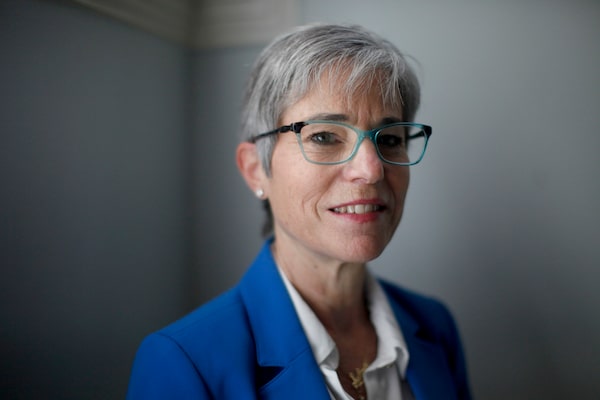
B.C. Finance Minister Selina Robinson said she’s spoken with federal Finance Minister Chrystia Freeland, who said Ottawa will help in the rebuilding effort in B.C.CHAD HIPOLITO/The Canadian Press
British Columbia’s economy was on track toward a strong economic rebound in its latest financial results, but uncertainties remain, especially stemming from the damage caused by recent floods and mudslides, says Finance Minister Selina Robinson.
The government will have a clearer picture of the cleanup costs associated with the disastrous floods, mudslides and infrastructure damage that hit communities, highways, railways and farms in the budget it tables in February, she said Monday.
“There’s still so much assessment that needs to be done,” Robinson said at a news conference updating B.C.’s fiscal bottom line up to the end of September.
“Right now, we have been focusing on rescue and recovery,” she said. “That’s been the priority of our government. Really, we’ve been focused on keeping people safe. There’s no doubt that this is going to be incredibly expensive.”
B.C. flooding: Latest news on North Coast storms, state of emergency, road closings and more
Solicitor General Mike Farnworth said earlier he couldn’t provide an estimate on last week’s damage other than to say it would be a huge cost for the province.
Robinson said she’s spoken with federal Finance Minister Chrystia Freeland, who said Ottawa will help in the rebuilding effort in B.C.
“That was certainly comforting to me as the finance minister here in B.C. knowing that they will work with us,” Robinson said. “It is premature to make any sort of assessment about how much this is going to cost.”
Robinson said the fiscal update showed an improved outlook for the province, with the deficit projected at $1.7 billion for the 2021-22 fiscal year, down from the previous projection of $4.8 billion in September. The government’s original deficit was forecast last spring at $9.7 billion.
Robinson said revenues have also increased by more than $3 billion in recent months, largely from personal, corporate and provincial taxes, higher commodity prices and financial improvements at Crown corporations, especially the B.C. Lottery Corp. and the Insurance Corp. of B.C.
The Opposition Liberals say the latest fiscal update shows the government is relying on an increase in revenue from personal income and property transfer taxes at a time when housing prices and inflation are rising during the ongoing COVID-19 pandemic.
“For a government that came to power on promises of affordability, it has somehow managed to fail at each and every turn,” said finance critic Mike Bernier in a statement.
“Now, as a result of the devastating floods from this past week, we enter a phase of some of the most expensive and difficult recovery in our province’s history with a government that has no idea how to invest in the economy or make good on its promises.”
For subscribers: Get exclusive political news and analysis by signing up for the Politics Briefing.
We have a weekly Western Canada newsletter written by our B.C. and Alberta bureau chiefs, providing a comprehensive package of the news you need to know about the region and its place in the issues facing Canada. Sign up today.